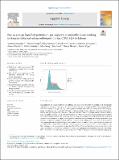| dc.contributor.author | Shupler, Matthew | |
| dc.contributor.author | O'Keefe, Mark | |
| dc.contributor.author | Puzzolo, Elisa | |
| dc.contributor.author | Nix, Emily | |
| dc.contributor.author | de Cuevas, Rachel Anderson | |
| dc.contributor.author | Mwitari, James | |
| dc.contributor.author | Gohole, Arthur | |
| dc.contributor.author | Sang, Edna | |
| dc.contributor.author | Čukić, Iva | |
| dc.contributor.author | Menya, Diana | |
| dc.contributor.author | Pope, Daniel | |
| dc.date.accessioned | 2021-08-13T07:20:55Z | |
| dc.date.available | 2021-08-13T07:20:55Z | |
| dc.date.issued | 2021-03 | |
| dc.identifier.citation | Shupler, M., O'Keefe, M., Puzzolo, E., Nix, E., de Cuevas, R. A., Mwitari, J., ... & Pope, D. (2021). Pay-as-you-go liquefied petroleum gas supports sustainable clean cooking in Kenyan informal urban settlement during COVID-19 lockdown. Applied energy, 292, 116769. | en_US |
| dc.identifier.other | https://doi.org/10.1016/j.apenergy.2021.116769 | |
| dc.identifier.uri | https://www.sciencedirect.com/science/article/pii/S0306261921002762 | |
| dc.identifier.uri | http://dspace.amref.org/handle/123456789/50 | |
| dc.description | This article is published by Elsevier | en_US |
| dc.description.abstract | Approximately 2.8 billion people rely on polluting fuels (e.g. wood, kerosene) for cooking. With affordability being a key access barrier to clean cooking fuels, such as liquefied petroleum gas (LPG), pay-as-you-go (PAYG) LPG smart meter technology may help resource-poor households adopt LPG by allowing incremental fuel payments. To understand the potential for PAYG LPG to facilitate clean cooking, objective evaluations of customers’ cooking and spending patterns are needed. This study uses novel smart meter data collected between January 2018-June 2020, spanning COVID-19 lockdown, from 426 PAYG LPG customers living in an informal settlement in Nairobi, Kenya to evaluate stove usage (e.g. cooking events/day, cooking event length). Seven semi-structured interviews were conducted in August 2020 to provide context for potential changes in cooking behaviours during lockdown. Using stove monitoring data, objective comparisons of cooking patterns are made with households using purchased 6 kg cylinder LPG in peri-urban Eldoret, Kenya. In Nairobi, 95% of study households continued using PAYG LPG during COVID-19 lockdown, with consumption increasing from 0.97 to 1.22 kg/capita/month. Daily cooking event frequency also increased by 60% (1.07 to 1.72 events/day). In contrast, average days/month using LPG declined by 75% during lockdown (17 to four days) among seven households purchasing 6 kg cylinder LPG in Eldoret. Interviewed customers reported benefits of PAYG LPG beyond fuel affordability, including safety, time savings and cylinder delivery. In the first study assessing PAYG LPG cooking patterns, LPG use was sustained despite a COVID-19 lockdown, illustrating how PAYG smart meter technology may help foster clean cooking access. | en_US |
| dc.language.iso | en | en_US |
| dc.publisher | Science Direct | en_US |
| dc.subject | Pay-as-you-go | en_US |
| dc.subject | Liquefied petroleum gas | en_US |
| dc.subject | LPG | en_US |
| dc.subject | Clean cooking fuels | en_US |
| dc.subject | COVID-19 lockdown | en_US |
| dc.subject | Informal settlement | en_US |
| dc.title | Pay-As-You-Go Liquefied Petroleum Gas Supports Sustainable Clean Cooking in Kenyan Informal Urban Settlement during COVID-19 Lockdown | en_US |
| dc.type | Article, Journal | en_US |

